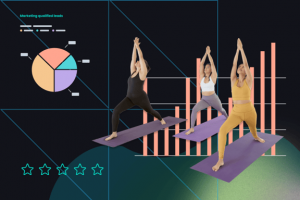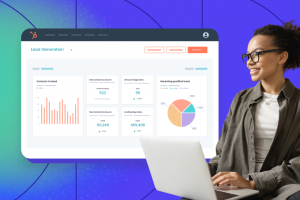
AI has quietly and quickly moved from being a shiny tool in the martech stack to becoming a fully functional part of the marketing team. Not an assistant. Not a supplement. But a digital team member—if not an entire department.
And here’s the part that might be hard to swallow: it’s outperforming its human predecessors in speed, accuracy, and scale. Welcome to the AI-powered marketing department. It’s not in beta. It’s here, it’s scaling, and it might just replace the way you think about building your team.
The Quiet Revolution: How AI Slipped Into the Driver’s Seat
According to Statista, the global AI in marketing market is expected to reach US$107.5 billion by 2028, up from just US$15.84 billion in 2021. That’s not a trend. That’s a transformation.
This shift didn’t happen with a bang. It was a series of small revolutions:
- Marketing automation platforms got smarter.
- Generative AI tools became better than junior copywriters.
- Predictive analytics turned campaign planning into a science.
- And marketers, desperate for efficiency and results, opened the door.
What snuck in was not just a tool, but a team—one that doesn’t sleep, doesn’t get overwhelmed, and never misses a deadline.
Meet Your New Marketing Team: The AI Department in Action
Let’s break down the AI-driven department. These are not hypothetical roles—they’re already in play at forward-thinking organizations:
- Chief Strategist (AI-powered): Uses real-time data from customer behavior, competitive intelligence, and market trends to build agile, objective-based marketing strategies. No biases. No guesswork.
- Creative Content Specialist (GenAI): Writes blogs, social posts, emails, and product descriptions in minutes. With tools like ChatGPT, Jasper, and Copy.ai, brands are deploying AI-generated content at scale.
- Campaign Manager (Automation Engine): Uses machine learning to run multichannel campaigns. It knows when to post, where to post, and who to target—often better than the humans who trained it.
- Analytics Director (Predictive Intelligence): Not only tracks KPIs, but forecasts performance, suggests changes mid-campaign, and A/B tests messaging in real time.
This isn’t AI supporting marketers. This is AI being the marketers. And it’s working
Robotic Marketer: The Blueprint for the AI-Driven Marketing Department
One of the pioneers behind this movement is Robotic Marketer—an AI-powered marketing operations platform that replaces traditional team functions with intelligent systems. It’s the first tool of its kind designed not to assist marketers, but to be the marketing department.
What Robotic Marketer does:
- Builds complete marketing strategies based on deep-dive competitor research, target audience behavior, and internal data.
- Executes campaigns across digital channels, integrating with platforms like HubSpot, Salesforce, and Google Ads.
- Provides real-time reporting, forecasting, and agile campaign management.
Companies using Robotic Marketer report not only improved efficiency but strategic coherence—something often missing when marketing teams are stretched thin.
And here’s what matters most: it doesn’t just make things faster. It makes them smarter.
The Tension: When Every Campaign Starts to Feel the Same
With all this power comes a paradox. As more brands use similar AI models to generate content, a chilling sameness starts to creep in.
You’ve probably noticed it already: Instagram captions that feel sterile, blogs that read like they were churned out by a robot (because they were), and marketing copy that lacks any emotional nuance.
In a world where speed and scale dominate, originality is at risk.
This is where the human marketer steps back in—not to battle AI, but to complement it.
Creativity is the Final Frontier
True creativity isn’t just about words or visuals. It’s about intuition, risk-taking, and a pulse on culture. AI can mimic patterns. But it can’t invent them—at least not yet.
The best marketing departments of the future will be hybrid:
- AI will handle the heavy lifting: data analysis, performance tracking, content scaling.
- Humans will provide the soul: brand voice, storytelling, emotional connection.
Think of it this way: AI can give you the melody, but humans still write the lyrics.
Real-World Results: The AI Marketing Advantage
Companies embracing AI in their marketing departments are seeing measurable benefits:
- Unilever uses AI to tailor ad creatives and target audiences, reducing cost per lead by over 30%.
- Coca-Cola leverages AI for content personalization, increasing engagement by over 25%.
- HubSpot reports that users implementing AI-driven automation saw a 20% increase in conversion rates.
And startups? They’re using AI to do what it used to take five people to accomplish—without compromising on quality.
Building Your Own AI Marketing Department
If you’re not there yet, it’s not too late. But the window is closing. Here’s how to get started:
1. Adopt an AI-First Mindset
Stop thinking of AI as an add-on. It’s now the core. Begin redesigning processes with AI at the center.
2. Choose Scalable Tools
Platforms like Robotic Marketer don’t just add efficiency—they build cohesion across strategy, execution, and reporting.
3. Upskill Your Human Team
Focus on what AI can’t do—creativity, empathy, strategic oversight. Your human team needs to evolve as curators, not just creators.
4. Focus on Data Hygiene
AI is only as good as the data it feeds on. Invest in clean, structured data sources for optimal output.
Future-Proofing: What Comes Next?
We’re already seeing early signs of what’s next:
- AI-generated video ads are replacing traditional shoots.
- Voice AI is scripting and producing entire podcast series.
- AI personas are conducting customer service and sales follow-ups.
The lines between departments are blurring, and AI is at the center of this fusion. Marketing, sales, and service are converging under a unified AI umbrella.
A Final Word: You’re Not Being Replaced—You’re Being Repositioned
The fear of AI is understandable. But the marketers who will thrive in this new era aren’t the ones who resist it. They’re the ones who reposition themselves.
They become:
- Strategists who guide AI.
- Storytellers who add soul to systems.
- Innovators who see possibilities where others see disruption.
Because in the end, AI isn’t replacing marketing teams. It’s replacing how those teams work. And the sooner you embrace that shift, the sooner you’ll lead it.

